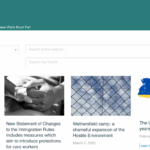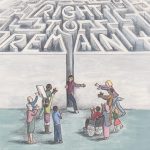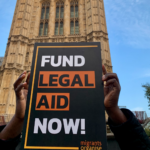“What I’m proposing is a deal – the fewer people there are who wrongly claim asylum in Britain, the more generous we can be in helping the most vulnerable people in the world’s most dangerous places.
And my message to the immigration campaigners and human rights lawyers is this – you can play your part in making this happen or you can try to frustrate it. But if you choose to frustrate it, you will have to live with the knowledge that you are depriving people in genuine need of the sanctuary our country can offer.
There are people who need our help and there are people who are abusing our goodwill and I know whose side I’m on.”
There’s nothing like a Theresa May statement to get the blood pumping. I’ve written before on this blog about her bad habit of ruining Sundays. You can pretty much add every day of the week to that (and I’m not even one of the people whose lives and families have been torn apart by cruel Home Office policies and decision-making – be that people seeking sanctuary, someone who has happened to fall in love with someone who isn’t British, or who just wanted to study here).
Time and again, I make the mistake of thinking I am beyond being shocked and appalled by the anti-immigration rhetoric poisoning parliamentary politics. Time and again, I am shocked and appalled.
May’s speech today at the Conservative Party conference was clever. Despite often betraying a huge ignorance of the law, she is no fool. As the Guardian reported, the Home Secretary “made clear that she prefers to offer asylum and refuge to people in parts of the world affected by wars and oppression and rather than rewarding the wealthy and the fit who make it to Britain.”
How fair, how just. How misleading.
Governments often prefer tidy systems of refugee resettlement, of taking quotas of people already determined to be in need of protection, from refugee camps in the global south. But fleeing war and persecution isn’t tidy. People flee in different ways, in different places, for different reasons. People’s desired destination is not the first safe place – people are not just refugees but have lives, hopes, dreams and agency beyond that. Sometimes people have little agency, and their destination is in the hand of people smugglers. Without safe, legal routes to sanctuary, refugees will always be at the mercy of smugglers.
‘Wrongly’ claiming asylum
The implication of May’s speech is that it is ‘false’ asylum-seekers (and of course, ‘immigration campaigners and human rights lawyers’) who are to blame for depriving those who are in ‘genuine’ need of protection. Talk of numbers and quotas around refuge is very problematic and this is why the Refugee Convention and human rights protection is available to everyone that needs it. Do you condemn to face persecution, torture, death, all those who claim asylum once your quota has been filled?
The notion of ‘genuineness’ is political and subjective. The asylum system denies many in need of protection, and in our opinion, does so deliberately. Official terminology for someone refused asylum is a ‘failed asylum seeker’, but if it is the system that has failed, who then is genuine? Asylum seekers and other migrants face legal, procedural and emotional barriers to securing their right to remain.
Asylum interviews are often hostile, and feel more like an interrogation. People are refused refugee status on the basis of a misremembered date or a confusion in translation or transcribing of the interview.
Many people are forced to navigate the asylum system with no legal representation, due to the savage legal aids cuts imposed over the years.
People are detained, away from their communities and families, making it even harder to access justice.
Over 25% of Home Office asylum refusals are overturned on appeal (the figure is much higher for some nationalities). Most of these overturned decisions are when people have managed to find a good lawyer to represent them. The majority of refused asylum seekers are not able to obtain such life-saving support.
It is these barriers that Right to Remain seeks to help people to overcome – the barriers preventing people from establishing their legal rights. This is why we produce our Toolkit on understanding the system, and taking action for the right to remain. This is why we work with grassroots groups across the UK, groups supporting people trying to navigate this bewildering, inhuman and often violent process.
Whose side are you on?
Why is Theresa May talking about sides? Why is she trying to blame immigration campaigners and human rights lawyers, and making it clear there are ‘good’ refugees and then there are bad ones?
The government was forced into a u-turn on the resettlement of Syrian refugees (even though the announced policy was a pathetically minimal response given the scale and gravity of the crisis) by a groundswell of popular opinion in favour of protecting refugees.
The public are demonstrating unprecedentedly visible and unified support for refugees, and the government are scared. Home Office tactics (especially their policies of immigration raids, detention and enforced removal) rely on divided communities. Unity and solidarity are incredibly powerful ways of undermining the state’s increasing attacks on migrants and the British poor.
Don’t let them divide us.














Discussion: